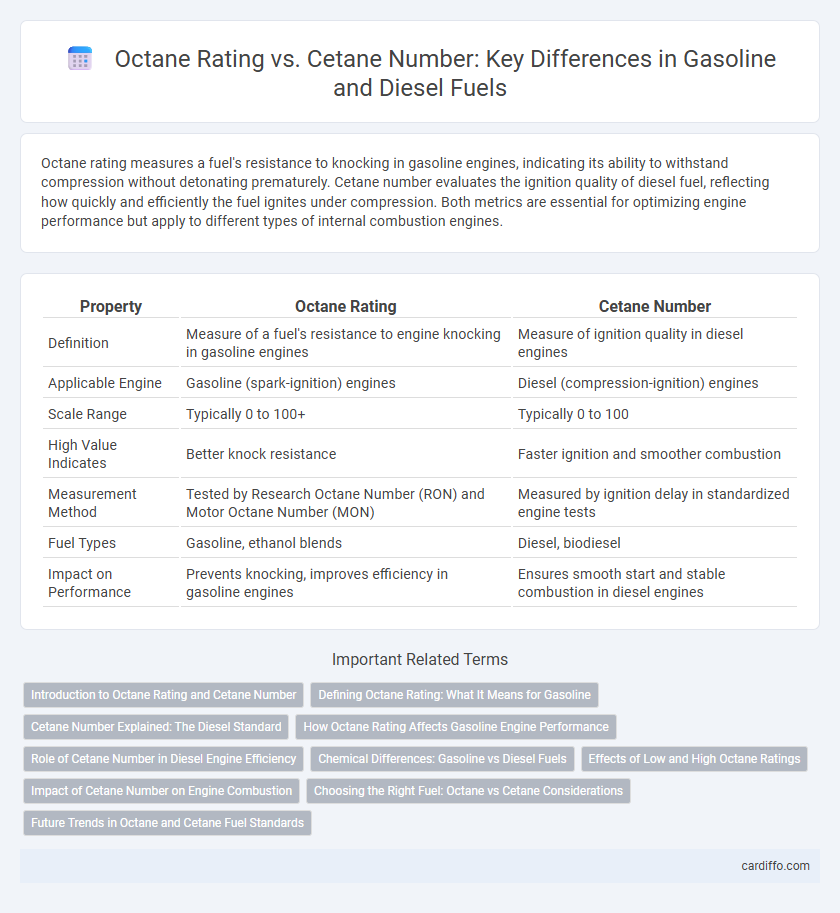Octane rating measures a fuel's resistance to knocking in gasoline engines, indicating its ability to withstand compression without detonating prematurely. Cetane number evaluates the ignition quality of diesel fuel, reflecting how quickly and efficiently the fuel ignites under compression. Both metrics are essential for optimizing engine performance but apply to different types of internal combustion engines.
Table of Comparison
| Property | Octane Rating | Cetane Number |
|---|---|---|
| Definition | Measure of a fuel's resistance to engine knocking in gasoline engines | Measure of ignition quality in diesel engines |
| Applicable Engine | Gasoline (spark-ignition) engines | Diesel (compression-ignition) engines |
| Scale Range | Typically 0 to 100+ | Typically 0 to 100 |
| High Value Indicates | Better knock resistance | Faster ignition and smoother combustion |
| Measurement Method | Tested by Research Octane Number (RON) and Motor Octane Number (MON) | Measured by ignition delay in standardized engine tests |
| Fuel Types | Gasoline, ethanol blends | Diesel, biodiesel |
| Impact on Performance | Prevents knocking, improves efficiency in gasoline engines | Ensures smooth start and stable combustion in diesel engines |
Introduction to Octane Rating and Cetane Number
Octane rating measures a gasoline fuel's resistance to knocking during combustion, with higher values indicating better stability under compression. Cetane number evaluates diesel fuel's ignition quality, where higher numbers correspond to shorter ignition delays and more efficient combustion. Both metrics are fundamental for optimizing engine performance and meeting emission standards.
Defining Octane Rating: What It Means for Gasoline
Octane rating measures gasoline's ability to resist engine knocking caused by premature fuel ignition under compression. Higher octane numbers indicate greater resistance to knocking, ensuring smoother engine performance and protecting engine components. Unlike cetane number, which gauges diesel fuel ignition quality, octane rating specifically pertains to gasoline's combustion stability.
Cetane Number Explained: The Diesel Standard
Cetane number measures the ignition quality of diesel fuel, indicating how quickly and efficiently it ignites under compression in diesel engines. A higher cetane number correlates with shorter ignition delay, resulting in smoother engine performance, reduced emissions, and improved fuel economy. Unlike the octane rating used for gasoline, cetane number is the critical standard for assessing diesel fuel combustion characteristics.
How Octane Rating Affects Gasoline Engine Performance
Octane rating measures a gasoline's resistance to knocking or premature ignition in spark-ignition engines, directly impacting engine efficiency and smoothness. Higher octane fuels allow engines to operate at higher compression ratios, improving power output and fuel economy while reducing engine knocking. Conversely, using fuel with an octane rating too low for the engine can cause pre-ignition, leading to performance loss and potential engine damage.
Role of Cetane Number in Diesel Engine Efficiency
Cetane number is a critical measure of diesel fuel's ignition quality, directly impacting engine performance and efficiency. Higher cetane numbers lead to shorter ignition delays, resulting in smoother combustion, reduced emissions, and improved fuel economy in diesel engines. Optimizing cetane ratings enhances cold-start performance and lowers engine noise, making it essential for maximizing diesel engine efficiency.
Chemical Differences: Gasoline vs Diesel Fuels
Octane rating measures a gasoline fuel's resistance to knocking during combustion, emphasizing its ability to withstand premature ignition under high pressure. Cetane number evaluates diesel fuel's ignition quality by indicating how quickly it combusts after injection, reflecting its ease of autoignition. Chemically, gasoline consists mainly of branched and aromatic hydrocarbons, promoting higher octane ratings, whereas diesel contains longer-chain alkanes with fewer branches, leading to higher cetane numbers essential for compression ignition engines.
Effects of Low and High Octane Ratings
Low octane ratings in fuel cause engine knocking, leading to reduced performance and potential damage in high-compression engines. High octane fuels improve engine efficiency and power by resisting premature ignition, especially in turbocharged or high-performance vehicles. Using low octane fuel in engines designed for high octane can increase emissions and decrease fuel economy.
Impact of Cetane Number on Engine Combustion
Cetane number directly influences diesel engine combustion efficiency by determining the ignition delay time, with higher cetane values resulting in shorter delays and smoother engine operation. Improved cetane number enhances fuel combustion quality, reducing emissions such as hydrocarbons and particulate matter while increasing power output. Accurate cetane rating in diesel fuels optimizes engine performance, fuel economy, and overall emission control.
Choosing the Right Fuel: Octane vs Cetane Considerations
Octane rating measures a gasoline fuel's ability to resist engine knocking during combustion, essential for high-performance spark-ignition engines, while cetane number gauges diesel fuel's ignition quality and combustion speed in compression-ignition engines. Selecting the right fuel depends on the engine type: high-octane fuels optimize spark-ignition performance and prevent knock, whereas higher cetane numbers ensure efficient ignition and reduced emissions in diesel engines. Understanding these ratings helps enhance engine efficiency, protect engine components, and meet specific manufacturer fuel requirements.
Future Trends in Octane and Cetane Fuel Standards
Future trends in fuel standards emphasize higher octane ratings for gasoline to improve engine efficiency and reduce emissions in advanced spark-ignition engines, while diesel fuels are increasingly required to have elevated cetane numbers to enhance combustion quality and reduce pollutants in compression-ignition engines. Emerging regulations and technological advancements are driving the development of biofuels and synthetic fuels with optimized octane and cetane levels tailored for next-generation internal combustion engines and hybrid powertrains. Industry forecasts predict continuous refinement of octane and cetane specifications to support stricter environmental policies and the global transition to cleaner, more sustainable transportation fuels.
Octane Rating vs Cetane Number Infographic

 cardiffo.com
cardiffo.com